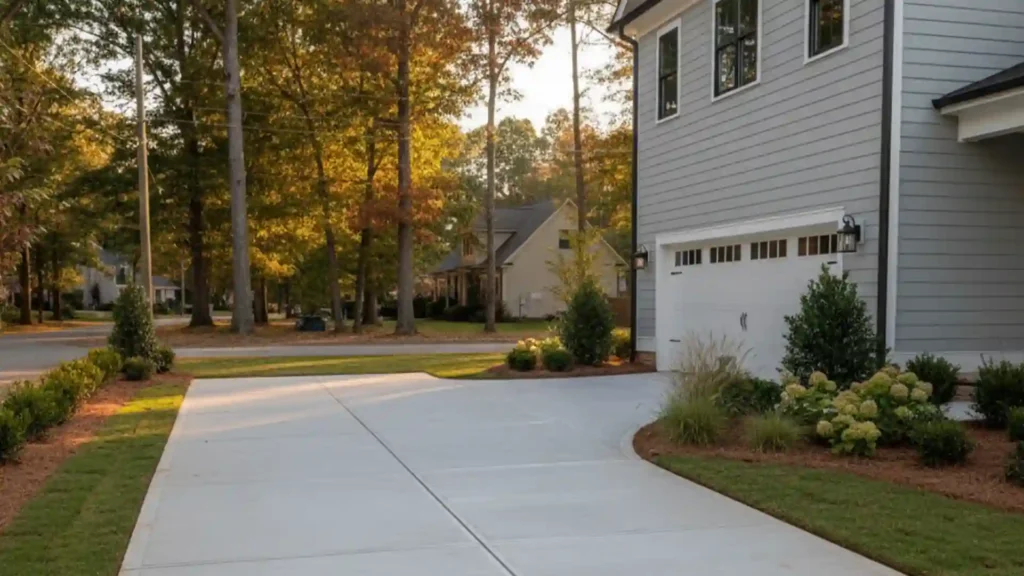Charlotte fall has a few seasonal challenges in store for your concrete driveway. Whether it’s falling leaves, cool nights, or temperature shifts, the surface and strength of your pavement may be compromised by one of these factors. If you would like to get a reliable driveway concrete contractor on board to keep your pavement looking and working like new, it is recommended that you do so at this time.
Initially, start by clearing debris and keeping the surface clean to prevent staining or moisture buildup. In addition, inspect your driveway for small cracks or uneven spots that may worsen once winter begins.
Finally, the application of a protective sealant will make a big difference in terms of moisture and freeze-thaw damage. Once you’ve confirmed your drainage sections are clean and functioning, you’ll be set to winterize your driveway for a lasting life cycle.
What Are the Essential Fall Driveway Cleaning & Preparation Steps?
By removing leaves and dirt you are allowing moisture to not get trapped, which helps reduce mold, plus according to The Texas A&M Transportation Institute’s catching stains early will help prevent chemical attack to the concrete slab. Effective prep also allows you to catch small issues before they become big problems.
Here is a handy table of basic actions — so you know what inspection, repair, sealing and more rest on.
Step | What to Do | Why It Matters | Timing / Notes |
Remove leaves, twigs & droppings | Use broom, leaf blower on low, rake | Prevents moisture retention, stains, mold | Weekly or more, as needed |
Treat oil & rust stains | Use concrete-safe degreaser | Stops etching or weakening of surface | Immediately when spotted |
Pressure wash gently | 2,000–3,000 psi, fan nozzle, 30° angle | Lifts embedded dirt, moss, grime | Work in sections |
Dry surface fully | Allow 24–48 hrs of air time | Avoids trapping moisture under sealants | Especially in shaded areas |
Sweep again | Collect loosened particles | Leaves a clean surface before sealing or repair | Right before repair/sealing |
Why Is Driveway Crack Repair Critical Before Winter?
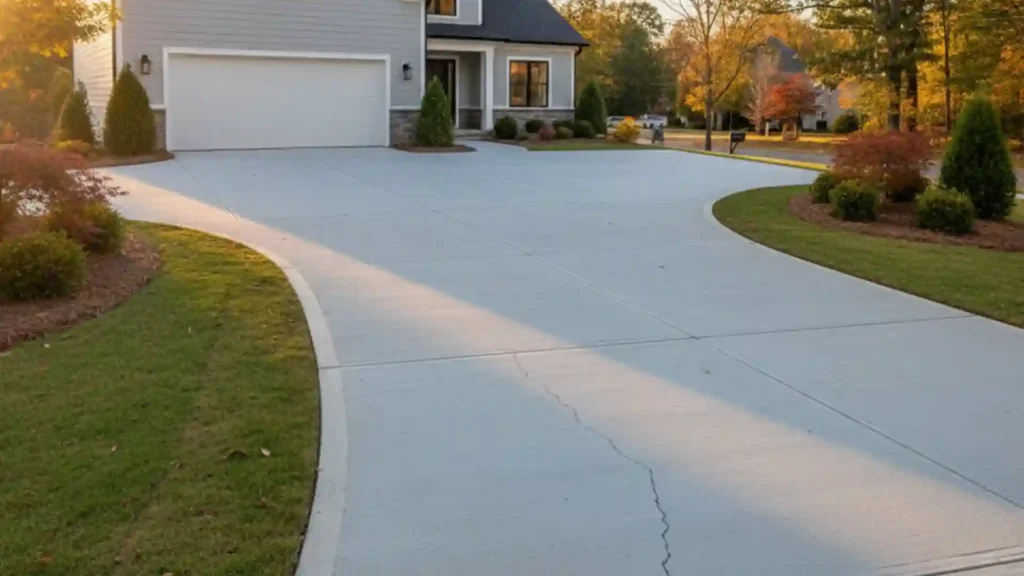
Here in Charlotte, those tiny driveway cracks during the cold months can certainly snowball into your worst nightmare. Initially, it seems as nothing more than a hairline crack on the surface.
But once water does penetrate it, and the temperature dips below freezing, that same water can expand relatively suddenly force — tensile stress in concrete might reach as high as 50 psi. A space such as this can turn into a large split or even a pothole in weeks.
Sealing up those blemishes before that first freeze can do more than just help your home pass the curb-appeal test. It restores the driveway’s structural integrity, removes trip hazards, and stops the process of deterioration right at its inception. What’s more, the sooner you fix it, the better result you will get; with less pitting and damage when the work is carried out by an experienced driveway installation contractor who knows what local soils and climate are like.
How does cold weather affect concrete?
In Charlotte, the fall weather can be unpredictable — cold nights, warm afternoons and rapid temperature changes contribute. These changes induce what’s known as the freeze-thaw cycle, in which your concrete driveway expands and contracts again and again. Imagine your driveway as if it were “breathing” with the weather — only this sort of breathing can be hard on us, especially when our bodies and driveways crack.
Here’s what happens step by step:
- First, water from rain or dew seeps into tiny pores or cracks in the concrete surface.
- Next, as temperatures dip to around 32°F(0°C)at night, that water freezes and expands, pushing outward with surprising force.
- Then, when the sun warms things up during the day, the ice melts and the pressure releases.
- Eventually, this cycle repeats — sometimes dozens of times a season in Charlotte — slowly widening those micro-cracks and making the surface flake or crumble (a process called spalling).
- Finally, if those cracks aren’t sealed, the damage compounds through winter, leaving your driveway weaker by spring.
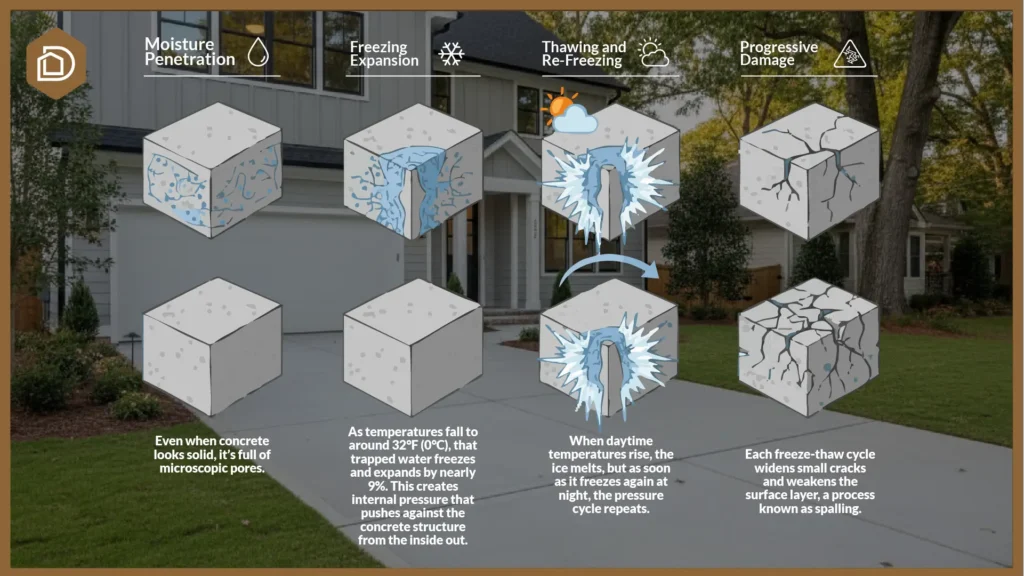
According to research from the National Concrete Pavement Technology Center, repeated freeze-thaw cycles are among the main causes of premature concrete deterioration when cracks are not properly sealed.
What Types of Cracks Should Charlotte Homeowners Look For?
Concrete driveways exhibit several crack types, each requiring specific attention and repair methods:
Crack Type | Characteristic | Recommended Response |
Hairline Cracks | Fine, less than 1/16 inch | Use polymer-modified filler |
Structural Cracks | Wider than 1/4 inch | Consult a professional repair |
Spalling | Surface flaking | Remove loose area; patch resin |
Corner Cracks | Cracks at edges or joints | Reinforce edges; seal joints |
Is it okay to seal a driveway in fall?
Sealing your concrete driveway in the fall is one of the smartest home improvementdecisions you can make. Not only does it protect your pavement from Charlotte’s unpredictable winter weather, but it also keeps your driveway looking clean and smooth for years to come.
Initially, fall is the ideal season because temperatures are consistently cooler — usually between 50°Fand70°F— which helps the sealant cure evenly and bond deeply to the surface. Furthermore, applying sealant before winter precipitation begins ensures the protective layer is fully set before the first freeze.
A high-quality sealant, especially one recommended by professional driveway concrete contractor or reputable concrete driveway sealer companies, works by:
- Filling microscopic pores in the concrete surface,
- Repelling water and oil,
- Blocking de-icing salts and other corrosive chemicals, and
- Reducing surface fading caused by UV exposure.
For lasting results, many concrete contractors suggest resealing every two to three years, depending on weather exposure and traffic levels. Partnering with a reliable driveway concrete contractor ensures that the right materials and curing methods are used for Charlotte’s specific climate and soil conditions.
What Are the Benefits of Sealing Your Driveway in Fall?
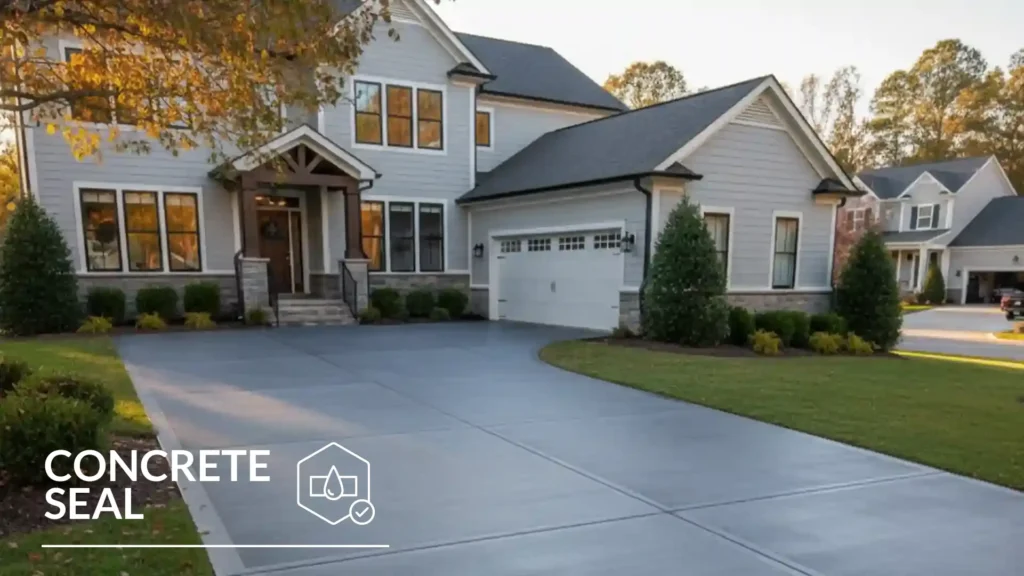
Applying concrete sealer to your driveway before winter has its own unique set of advantages, such as:
- Protection Against Moisture: Help keep water from infiltrating the wall material, which can cause freeze/thaw
- Chemical Resistance: Shields against de-icing salts, automotive fluids, and other corrosive agents.
- Fade Prevention: Guards against UV rays that cause colour loss or surface dulling.
- Surface Hardening: Strengthens the top well layer to produce better resistance to tire wear and abrasion.
- Curb appeal: Maintains the colour of your driveway and gives it a clean, well-kept appearance.
In addition, sealing in autumn allows the surface to “breathe” and cure under mild, steady conditions, something that’s harder to achieve in the heat of summer or the chill of winter. Consequently, the seal lasts longer and offers better performance through the colder months.
Which Concrete Sealants Work Best for Charlotte’s Fall Weather?
Charlotte’s autumn climate—characterized by moderate humidity and occasional lows near freezing—demands sealants that cure at cooler temperatures and resist moisture intrusion.
The table below compares top sealant types suited for local conditions:
Sealant Type | Key Attribute | Performance Benefit |
Acrylic | Fast cure at 50–70°F | Forms a durable film for stain resistance |
Siloxane | Deep penetration, breathable | Repels water while allowing vapor release |
Epoxy-Acrylic | Hybrid chemistry | Combines toughness with UV stability |
How Do Professional Sealing Services Enhance Driveway Longevity?
Professional driveway sealing by an experienced concrete contractor delivers uniform application, optimal preparation, and high-quality materials unavailable in retail kits. Technicians perform pressure washing, crack repair, and surface profiling to create a flawless substrate for sealant bonding.
At Durafy, our professional concrete driveway contractors take sealing one step further using a specialized process known as the Double-Cure Method.
We spray a mist of water on the surface after we apply the sealant, about 20 minutes later. This quick re-hydration makes for a stronger polymer bond and a tighter-fitting seal that withstands Charlotte’s freeze-thaw cycles and keeps your home looking better, longer.
Method | How It Works | Result |
Standard Sealing | One application left to air-cure naturally | Basic protection that may weaken under winter stress |
Durafy Double-Cure | Second light mist applied after 20–30 minutes to reactivate curing | Stronger bond, smoother finish, and up to 25% longer sealant life |
How to Maintain Your Driveway Through Winter?
With winter arriving in Charlotte, your concrete driveway is subjected to freezing temperatures, moisture, de-icing agents, and the occasional ice or snow.
You don’t have to feel more helpless. Here are some concrete sealing tips to save your pavement that are simple and manageable for every homeowner. There’s also a handy suggestion from your Durafy crew on when to call the experts.
- Regularly Sweep Surfaces
Frequent sweeping prevents leaves, dirt, and debris from settling by trapping moisture. As well as safeguarding against staining, it reduces the risk of surface scaling amplified by water penetration.
- Remove Snow With Care
Using a metal shovel or blade is likely to result in small gouges on the surface. To prevent scratching or damaging the sealant, opt for plastic tools and lift rather than drag snow.
- Use De-icing Products Sparingly
Rock salt will chemically attack the surface and intensify freeze-thaw damage. Calcium magnesium acetate and sand provide traction without affecting durability.
- Monitor Drainage After Rain and Thaw
One of the leading causes of surface degradation is standing water. The surrounding gutter, downspout, and slope must be oriented away from the paved area to eliminate cracks from forming during evening freezes.
- Overlook Small Cracks
Small fissures have a tendency to enlarge as the freeze/thaw cycle repeats over time. By carefully sealing cracks as they appear, the homeowner can prevent moisture penetration, reducing the potential need for expensive spring or early summer repairs.
- Schedule an Appointment for a Professional Inspection
Before winter sets in, a review by residential concrete driveway contractors can identify early signs of spalling or structural wear that might not be visible to the untrained eye. Professional maintenance strengthens long-term performance and protects your investment.
Before Winter Sets In
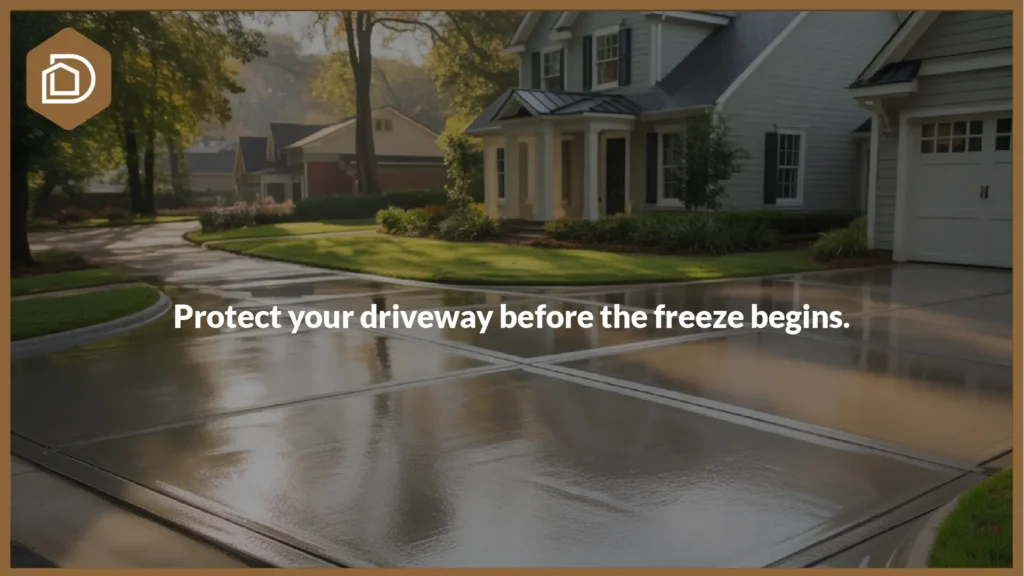
At Durafy, we work year-round across Charlotte’s changing climate, so we understand how local weather affects every phase of aconcrete driveway installation. Still, we recommend planning maintenance or repairs before the first real cold snap. Early sealing and inspection protect your surface from freeze-thaw stress and help avoid costly repairs in spring.
Booking it with our team means your project can be seen quickly and is always under the supervision of expert concrete contractors who know just how to keep your home improvement paying off the whole winter through!
Fall Driveway FAQs for Charlotte: Sealing, Repair & Prep Tips
Early to mid-fall is ideal for sealing. Temperatures are mild enough for the sealer to cure properly, and you’ll protect the surface before winter’s freeze-thaw cycles cause cracks.


